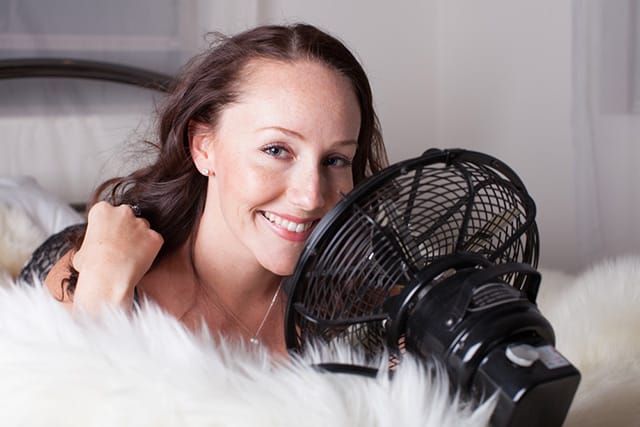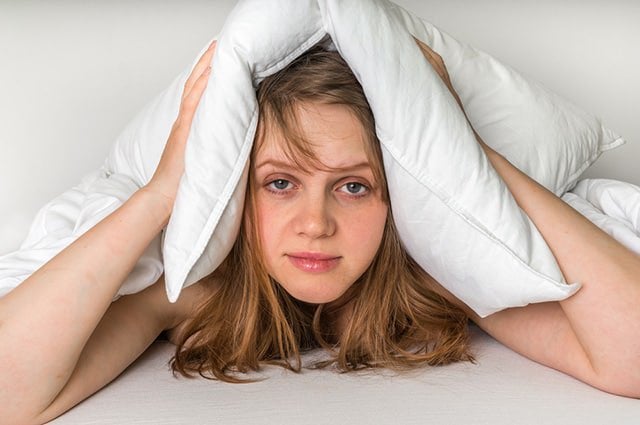Side Effects of Sleeping with a Fan on all Night. This is because as the fan circulates it dries the air out and when you breathe in that dry air it can cause your nasal passages to.

Is Sleeping With A Fan On Bad For You The Sleep Judge
How to Stop Sleeping with a Fan.

Is sleeping with a fan bad for your ears. However most modern fans are pretty quiet and are more likely to support restful sleep than disrupt it. The decibels produced by almost all consumer grade household fans are not high enough to cause any hearing damage. We dont recommend wearing hearing aids in bed because they may be prone to falling out while youre sleeping.
As it moves air around in your room it can lead to dust and pollen making its way into your sinuses. A fan can be really bad if you have allergies. Seema Sarin MD director of lifestyle medicine at medical.
And dry air can irritate the mucus membranes in your sinuses. The fans speed and distance from you determine its degree of impact on your health. If your fan is difficult or impossible to clean it may be circulating dust around your room.
This problem is easily adverted by keeping fans dust free and cleaning out filters on filtered air systems. Sleeping with earplugs can significantly improve the quality of your sleep. You may want.
Fans that are not used during the day tend to collect dust. 25 July 2018 1218. This can cause trouble for anybody who has allergies asthma or hay fever.
Yes its probably from sleeping in the room with the fan running but not what you think. Thus there is not assurance that your hearing aids will stay in your ears. By now youve learned all of the benefits and potential risks of sleeping with a fan at night.
As of late Ive been waking up with a lot of phlem in my throat and my ears feel clogged too. But the truth is tinnitus is related to being exposed to loud noises or infections and there is really no evidence that having air blowing on you can give you tinnitus. There is an old wives tale or at least a rumor that sleeping under a fan will give you tinnitus.
The air also dries out nasal passages. So initially wondering if the cold air could of created an ear ache cold. Sleeping with a fan on bad for your ears.
Sleeping with a fan can help to cool your body while you sleep but it may cause more harm than good if you suffer from allergies Dr. If you do sleep with a fan on Horovitz said its a good idea to keep it at a safe distance from your. Fans may also circulate dust which could bother people particularly if they have allergies.
Though sleeping with the fan on may be bad for your health there are ways to minimize its negative effects. A blowing fan can often dry out the air in your bedroom. Sleeping with a fan on at night is bad for your health.
If you do not already know Tinnitus is a ringing or buzzing in your ears that you cannot get rid of. By using a fan you have naturally tried to mask the sound or distract your ears with the external stimulus at bedtime which is a quieter time and quite often when folks report more focus on their tinnitus. The constant stream of air might dry out your throat especially if you sleep with your mouth open.
And sleeping with the fan wont cause arthritis. Answered 2 years ago Author has 432 answers and 1459K answer views. Here are some of the consequences youre likely to face.
Your ringing is the pitch of the fans motor. If you have sore muscles the constant flow of cold air hitting your body could make these muscles contract causing more pain. When sleeping your head rubs against a pillow and your sleeping positions may change throughout the night.
One way to minimize this risk is to use a fan that rotates rather than one that blows a steady and unrelenting flow in one concentrated area all night. If you are using an extremely old or poor-quality fan that makes a lot of mechanical noise your fan may not be good for your ears. While the circulating air might aggravate allergies and dry out your skin and eyes a fan can also provide comfort and soothing white.
The tube that runs from your middle ear to the back of the throat if obstructed by swelling due to inflammation will produce ear pain. As I mentioned before sleeping with a fan on can have effects on your health particularly if youre sensitive to air pollutants so you need to make sure youre safe. A dust-covered fan blowing toward a sleepers head has the potential to clog the sinuses.
For many people earplugs are the only way to block out sounds while they sleep such as noise from a nearby freeway or. But there are some negative side-effects that can come from sleeping with your fan on. Keeping the fan further away from you or setting a timer can prevent nasal congestion headaches muscle aches and eye dryness.
There are pros and cons of sleeping with a fan on at night. The same goes for ears if you have a preexisting ear. Sleeping with a fan on all night you could be at risk of sinus problems exacerbated allergies and dehydration among other health issues.
I sometimes sleep with the fan on and when I wake up in the morning my throat is dry and I have alot of phelm. Although sleeping with a fan shouldnt cause a significant amount of pain in healthy muscles or ears it isnt a huge stretch that discomfort could occur. 25 July 2018 1039 Updated.
If you have tinnitus sleeping with a fan on can actually help you sleep better. I was wondering if this is caused by snoring or if the fan is drying out my throat. Sleeping with a fan does not cause tinnitus.
Dust and pollen may be making their way into your sinuses if you use a fan. Try purchasing a fan thats easier to disassemble so that you can clean it thoroughly. Im guessing that you are becoming hyper aware of the sound of the fan in the quiet.

Can Sleeping With A Fan Cause Tinnitus Is It Bad For Your Ears

Is Sleeping With A Fan On Bad For You The Sleep Judge

Is Sleeping With A Fan On Bad For You The Sleep Judge